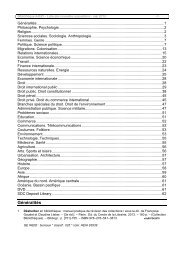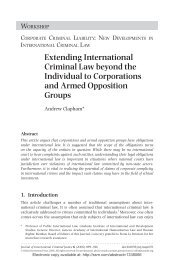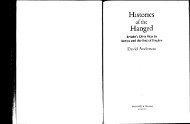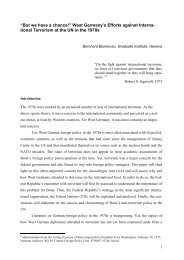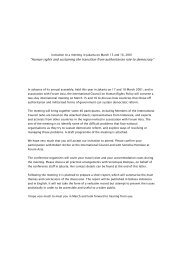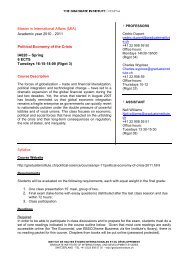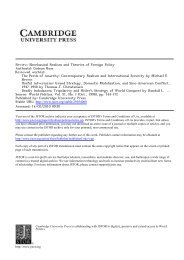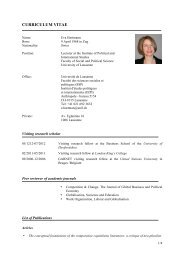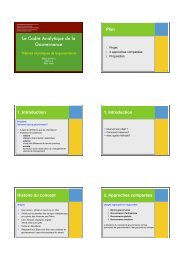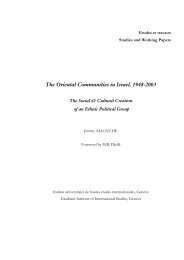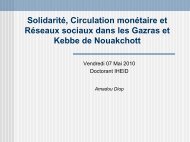Switzerland - The Graduate Institute, Geneva
Switzerland - The Graduate Institute, Geneva
Switzerland - The Graduate Institute, Geneva
Create successful ePaper yourself
Turn your PDF publications into a flip-book with our unique Google optimized e-Paper software.
INTERNATIONAL FELLOWSHIP OF RECONCILIATION, IFOR<br />
International Fellowship of Reconciliation (IFOR),<br />
Address<br />
Spoorstraat 38, Alkmaar, 1815 BK, <strong>The</strong><br />
Netherlands (see below for Swiss section)<br />
Phone + 31 (0)72 512 3014<br />
Fax + 31 (0)72 515 1102<br />
Web www.ifor.org<br />
E-Mail office@ifor.org<br />
Category Dialogue<br />
MISSION STATEMENT<br />
Founded in response to the horrors of war in Europe, IFOR has taken a consistent stance against war and its preparation throughout<br />
its history. Perceiving the need for healing and reconciliation in the world, the founders of IFOR formulated a vision of the human<br />
community based upon the belief that love in action has the power to transform unjust political, social, and economic structures.<br />
IFOR members share a vision of a world where conflicts are resolved through nonviolent means, where systems that foster fear and<br />
hatred are dismantled, and where justice is sought as a basis for peace. While coming from diverse religious backgrounds, we have a<br />
common belief in the transforming power of nonviolence and reconciliation.<br />
Founding year 1919.<br />
BACKGROUND AND ACTIVITIES<br />
Today IFOR has 69 branches, groups, and affiliates in 43 countries on all continents. Although organized on a national and regional<br />
basis, IFOR seeks to overcome the division of nation states which are often the source of conflict and violence. Its membership<br />
includes adherents of all the major spiritual traditions as well as those who have other spiritual sources for their commitment to<br />
nonviolence. IFOR members carry out public education efforts, organize training programs, and coordinate campaigns.<br />
IFOR has identified five main areas of concern for continued program development. Many branches and groups carry out local<br />
projects on these issues:<br />
� Decade for a Culture of Nonviolence. Since the initiation of the United Nations Decade for a Culture of Peace and<br />
Nonviolence for the Children of the World, in 2001, IFOR members have been active in working for peace education and in<br />
working to establish national coalitions to support the Decade.<br />
� Nonviolence Education and Training. IFOR assists groups and individuals to find ways in which they can transform conflicts<br />
into positive and growth oriented interactions that involve dialogue and lead to reconciliation. This is done through various<br />
presentations and training programs, as well as through the creation of resource materials and contact with trainers and<br />
resource people.<br />
� Youth Empowerment. IFOR provides young people with the skills and opportunities to become active peacemakers.<br />
� Interfaith Cooperation. Religion has on occasion played a central role in fomenting conflict but can also be a source of<br />
inspiration and leadership for peace. IFOR sponsors interfaith delegations to areas of conflict and publishes material on<br />
nonviolence from different religious traditions.<br />
� Disarmament. IFOR members support conscientious objectors, campaign for a ban on land mines, and oppose nuclear<br />
weapons and all other weapons of mass destruction.



![Download [pdf] - The Graduate Institute, Geneva](https://img.yumpu.com/23370020/1/190x248/download-pdf-the-graduate-institute-geneva.jpg?quality=85)
